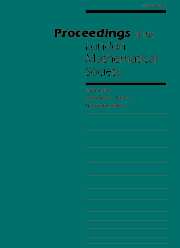Article contents
PENCILS OF CURVES ON SMOOTH SURFACES
Published online by Cambridge University Press: 23 August 2001
Abstract
Although the theory of singularities of curves - resolution, classification, numerical invariants - goes through with comparatively little change in finite characteristic, pencils of curves are more difficult. Bertini's theorem only holds in a much weaker form, and it is convenient to restrict to pencils such that, when all base points are resolved, the general member of the pencil becomes non-singular. Even here, the usual rule for calculating the Euler characteristic of the resolved surface has to be modified by a term measuring wild ramification.
We begin by describing this background, then proceed to discuss the exceptional members of a pencil. In characteristic 0 it was shown by Há and Lê and by Lê and Weber, using topological reasoning, that exceptional members can be characterised by their Euler characteristics. We present a combinatorial argument giving a corresponding result in characteristic p. We first treat pencils with no base points, and then reduce the remaining case to this.
2000 Mathematical Subject Classification: primary 14H20; secondary 14D05, 14E22, 14F20.
Information
- Type
- Research Article
- Information
- Proceedings of the London Mathematical Society , Volume 83 , Issue 2 , September 2001 , pp. 257 - 278
- Copyright
- 2001 London Mathematical Society
- 11
- Cited by

